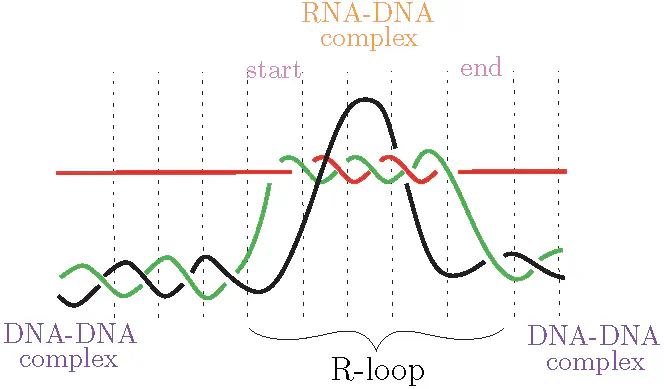
Project Leaders
- Margherita Maria Ferrari, University of Manitoba
- Chris Soteros, University of Saskatchewan
Postdoctoral Mentor
- Matthew Schmirler, University of Saskatchewan
Problem Statement
DNA and RNA contain the genetic code of life. They typically occur in the form of long polymers that are subjected to high levels of confinement. During cellular processes, modifications of the geometry and topology of DNA and RNA can yield multi-stranded structures such as R-loops. An R-loop is a 3-stranded structure composed of an RNA-DNA complex and another single strand of DNA. Experimental studies indicate that R-loops can play either destructive or regulatory roles in cellular processes. Thus, it is important to determine the factors influencing R-loop formation and stability. It is known that both DNA sequence and topology affect R-loop formation, however, little is known about their topological entanglement.
We propose to continue a VXML project started last year and use techniques from knot theory and combinatorics to address questions about the geometry and topology of 3-stranded polymers such as R-loops. Ferrari and coworkers have developed a sequence-dependent method for predicting the location of R-loops based on a formal grammar model. Given a DNA sequence, the model can be applied to predict the probabilities of R-loop formation along the sequence. Last year the team used some preliminary information from the formal grammar model to explore two simplified Markov chain models of R-loops: one model for R-loop formation and the other for R-loop geometry. The geometry model however was not 3-dimensional and hence could not be used to predict the nature of entanglements that can occur. In order to address questions about entanglement complexity, this year a 3-d lattice model of 3-stranded polymers under confinement will be used. The improved model will also include sequence-dependent information derived from the formal grammar model. The ultimate goal will be to integrate the different mathematical approaches of the mentors to obtain improved mathematical models of R-loops.
Details
- Expected team size: 4
- Student Experience Level: Beginner: students who have taken multivariable calculus
Prerequisites
- Linear algebra
- Introduction to probability
Skills
- Python
- C++